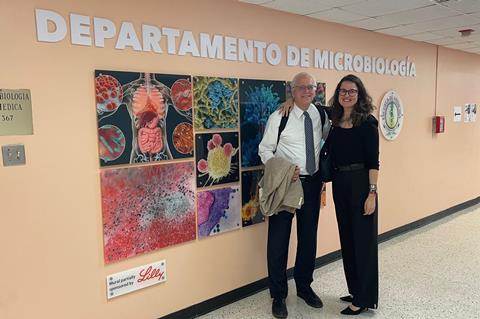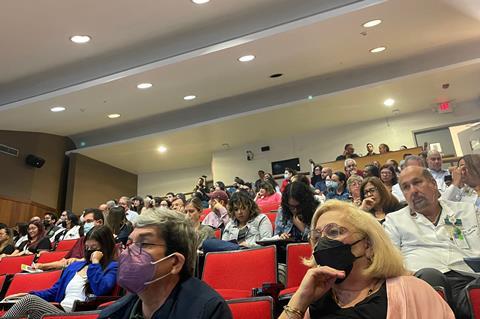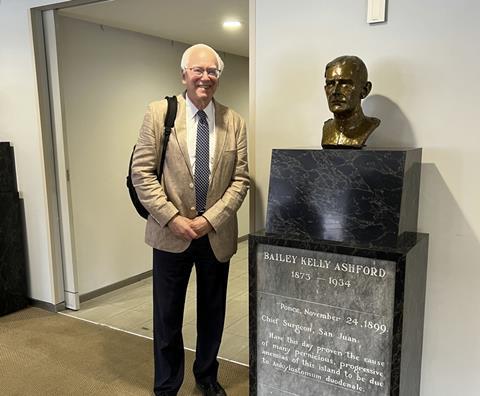A fascinating talk on microbiome disruption and restoration was delivered by Dr Martin Blaser for the Ashford Memorial Lecture 2023.

Co-organised by Filipa Godoy-Vitorino, AMI Global Ambassador for the Americas (Caribbean Region), the Ashford Memorial Lecture 2023 celebrated the legacy of Dr. Bailey Kelly Ashford, one of the founding fathers of the University of Puerto Rico School of Medicine and a distinguished medical doctor who changed the infectious disease landscape of Puerto Rico in the early 20th century.
His memory is honoured each year with the Ashford commemorative lecture series, for which Dr Martin Blaser was invited as Speaker in March 2023.
Compelling theories
“Blaser’s groundbreaking studies on the role of bacteria in human diseases and his compelling theories on how the loss of microbes is causing modern epidemics are some of the most important contributions to modern microbiology and celebrate the spirit of Dr. Ashford,” said Dr Godoy.
The conference was held on the amphitheatre of the UPR Medical School Thursday on March 30. Blaser delved into the ecological effects of antibiotic exposures, focusing on microbiome disruption and clinical consequences.

”Blaser, with his unparalleled expertise and communicative capacity, clearly showed how antibiotics have long-term effects on host metabolic and immune development, other perturbations to the microbiota, how these microbiomes are transmitted, and the consequences of early perturbations to disease consequences in adults. He also highlighted new solutions based on microbiome restoration, quickly becoming a new field in microbiology,” Dr Godoy said.
Dynamic event
Dr. Blaser chatted with faculty and medical students and was hosted on Friday, 31st by the Department of Microbiology, where graduate students presented their projects in a dynamic morning session with a 5-minute elevator pitch format.
The afternoon saw the premiere of “The Invisible Extinction” in Puerto Rico which spotlights Blaser’s extraordinary work and the charismatic personalities of both he and his microbiologist wife, a former Professor of the University of Puerto Rico Rio Piedras Campus, Dr. Maria Gloria Dominguez-Bello, as they endeavour to save the vanishing microbes that are essential for our survival and to create the microbiota vault.

The film joins them in travels around the world, from the USA to Venezuela, China, Israel, and Switzerland, showing us how the overuse of antibiotics, elective C-sections, and processed foods is driving the destruction of our inner ecology. Blaser and Bello discussed the subject with the many attendees in a post-screening Q&A session, and were joined by other faculty members and a graduate student to examine the exciting topic of human microbiome and health.
List of achievements
Dr Blaser is the Director of the Center for Advanced Biotechnology and Medicine; the Henry Rutgers Chair of the Human Microbiome and a Professor at the Departments of Medicine and Pathology & Laboratory Medicine of the Robert Wood Johnson Medical School at Rutgers University in New Jersey.
In 2015 he was named by Time Magazine as one of the 100 Most Influential People in the world, a year in which he was appointed senior advisor of the Canadian Institute for Advanced Research (CIFAR).
He was appointed by President Obama as the Chair of the President’s Advisory Council on Combating Antibiotic-Resistant Bacteria (PACCARB) for a term from 2015–2022, serving in the Obama, Trump, and Biden administrations.
Blaser was the recipient of the Robert Koch Gold Medal in 2019, the UK Microbiology Society Medal in 2020, and in 2022 received Docteur honoris causa from the University of Bordeaux, France.
Influential scientist
“Dr Blaser is unquestionably one of the greats, one of the most influential scientists and medical doctors of our time, and the University of Puerto Rico was honored to declare him the 61st Ashford keynote speaker,” Dr Godoy said.
![Image[4]](https://d3rmrttq0bsnxi.cloudfront.net/Pictures/480xany/8/0/9/2809_image4_665121.jpeg)
The lecture series commemorates the work of Dr. Bailey Ashford, a Georgetown MD graduate who joined the US Army as colonel and arrived with the American troops in 1898 to study the anaemic condition of Puerto Rican rural people.
Colonel Ashford (September 28, 1873 – November 1, 1934) traveled to Puerto Rico during the Spanish American War and, due to his training in tropical medicine, was instructed to stay once the military control of the island became official and the territory’s government was merged.
Anaemia link
Ashford discovered that nematode parasites were causing anaemia, later classifying them as Necator americanus in work that led to the creation of the Anemia Commission in 1904. He later co-founded the Institute of Tropical Medicine, resulting in the University of Puerto Rico School of Medicine.
”Ashford was one of the pivotal figures in academic medicine in Puerto Rico, and a driving force in the creation of the Medical School, with his unwavering commitment to treating many diseases, including pioneer dietary studies in patients with tropical sprue,” Dr Godoy said.
Follow the work of Dr Godoy-Vitorino at the University of Puerto Rico and her lab outcomes at @thegodoylab.







No comments yet